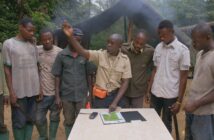Over the past few weeks, friends and colleagues from around the world have written to express concern about what the results of the US presidential election might mean for all of us who care passionately about every aspect of JGI’s work – conservation, animal welfare, peace, human rights and wellbeing and environmental education. I absolutely share their concern. I am writing today to call on each of you, my friends and colleagues, to maintain hope, whilst being prepared to work even harder to do what is right for people, other animals and Planet Earth. And be prepared to stand up and speak out for our beliefs. For if we lose hope we shall sink into apathy – then all will be lost.
I am writing today to call on each of you, my friends and colleagues, to maintain hope, whilst being prepared to work even harder to do what is right for people, other animals and Planet Earth.
It has been suggested that when Mr. Trump becomes president he might rethink some of these issues. Will Donald Trump, the President of the United States, be a different person from Donald Trump, the presidential candidate? Will Mr. Trump reach out to half the U.S. voters that were not his supporters, in an attempt to unify the country? We can only hope for the best, hope for a change of heart as he contemplates his tremendous power for helping to save our planet for the future – his youngest child is only 10 years old – and his equally tremendous power to inflict untold damage.
If he decides on the former, we must stand ready to support him. If the latter, we must be ready to work together, without the support of government, to carry on our work. There is some hope in the fact that, in the wake of the election, 365 corporations and investor groups came together to urge Mr. Trump to keep the US commitments under the Paris Agreement on Climate Change. These business leaders are urging responsible action not only because they know it is the right thing to do for the planet, but also because they know it is in the interest of their companies to do so. Their customers – the general public worldwide – increasingly understand that we can and must address climate change. As members of that general public, we must make our voices heard.
Their customers – the general public worldwide – increasingly understand that we can and must address climate change. As members of that general public, we must make our voices heard.
I think it is important to ask ourselves why Mr. Trump was elected. It seems that many pro-Trump votes were cast by people who felt betrayed by successive administrations – which was, incidentally, the root cause of the Brexit vote in the UK. Certainly in the US, the UK, and many other countries, there are large sections of the population that feel marginalized, see few opportunities for improving their lives and getting good jobs. Certainly there is much racial and religious and even class discrimination, that has given rise to resentment, even hatred, and increasing violence. And certainly the gap between the haves and the have-nots has been gradually widening, as have the differences between people living in urban and rural areas. For these and other reasons, thousands of people are desperate for change. It is very important that we understand and address some of their legitimate concerns. Indeed, NGOs have, in so many cases, taken over work that was originally considered to be the responsibility of governments.
It is very important that we understand and address some of their legitimate concerns. Indeed, NGOs have, in so many cases, taken over work that was originally considered to be the responsibility of governments.
If we, who care, get together we can try to find ways of advancing our common agenda — to, for example, offer environmental education in all schools, or offer innovative programs to engage and inspire disadvantaged youth. To work in the growing sectors that are turning the power of nature – the sun, wind, tides and so on – into clean energy. Or the growing imaginative ways of reusing, recycling our mountains of waste. Small scale, local farming, community-based services that provide care for the young and the old, those who fix things so we don’t need to buy new things – mechanics, electricians, carpenters – all offer the chance for knowledge to be passed now, informally, to help create a new generation of respected, important and fairly compensated members of the community.
We at JGI, along with so many others, have been working so hard to make this a better world. I travel 300 days a year, talking to hundreds of thousands of people, assuring everyone that, if we get together and make wise decisions in our daily lives, we can at least slow down climate change and eventually reverse the destruction of the natural world. With Roots & Shoots in nearly 100 countries, with well over 100,000 active groups of all ages, and many “alumni” already out in the world, there are already huge numbers of people who believe change is possible. These young people understand that each of us makes some difference – every day. We all have a choice as to what sort of difference we make.
And so, if we all come together with determination and increased solidarity, we can surely find ways to carry on with our work no matter what happens. I have absolute faith in the indomitable human spirit.
We all have a choice as to what sort of difference we make. And so, if we all come together with determination and increased solidarity, we can surely find ways to carry on with our work no matter what happens. I have absolute faith in the indomitable human spirit.
WE CAN – nay, we MUST – PREVAIL.




